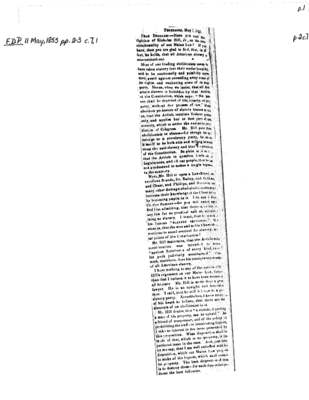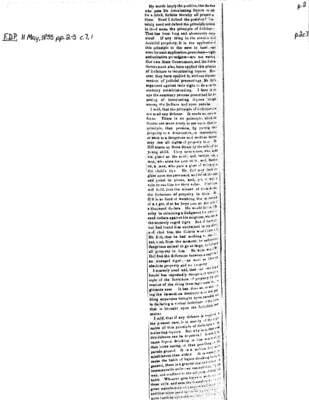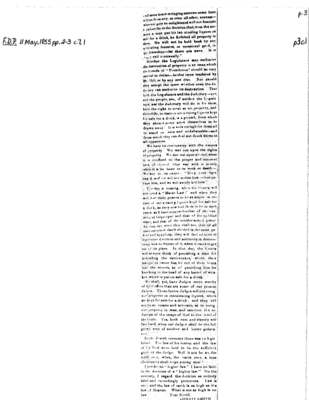Pages
D6780_Page_1
PETERBORO, May 7, 1855.
Dear DOUGLASS:—Have you read the Opinion of Nicholas Hill, Jr., on the constitutionality of our Maine law? If you have, then you are glad to find, that, in effect, he holds, that all American slavery is unconstitutional.
Most of our leading abolitionists seem to have taken slavery into their tender keeping, and to be continually and painfully upon their guard against conceding away some of its rights, and weakening some of its supports. Hence, when we insist, that all American slavery is forbidden by that Article of the Constitution, which says: "No person shall be deprived of life, liberty, or property, without due process of law," these abolition protectors of slavery hasten to tell us, that the Article restricts Federal power only, and applies but to that part of our country, which is under the exclusive jurisdiction of Congress. Mr. Hill puts these abolitionists to shame—for though he still belongs to a pro-slavery party, he shows himself to be both able and willing to teach them the anti-slavery and true construction of the Constitution. So plain is it to him, that the Article in question binds all our Legislatures, and all our people, that he does not condescend to notice a single argument to the contrary.
Were Mr. Hill to open a Law-School, our excellent friends, Dr. Bailey, and Giddings, and Chase, and Phillips, and Garrison, and many other distinguished abolitionists, might increase their knowledge of the Constitution, by becoming pupils in it. I do not include Charles Sumner—for you will never again find him admitting, that there is, or can be, any law for so piratical and abominable a thing as slavery. I trust, that he is sick of his famous "SLAVERY SECTIONAL." How strange, that the wise and noble Chase should continue to stand sentinel for slavery, at vital points of the Constitution!
Mr. Hill maintains, that the Article under consideration was intended to secure "against forfeitures of every kind, except for guilt judicially ascertained." Clean work, therefore, does his interpretation make of all American slavery.
I have nothing to say of the merits of Mr. Hill's argument on our Maine Law, further than that I believe it to have been written in all honesty. Mr. Hill is more than a great lawyer. He is an upright and honorable man. I said, that he still belongs to a proslavery party. Nevertheless, I know enough of his heart to believe, that there are the elements of an abolitionist in it.
Mr. Hill denies, that "a statue, depriving a man of his property, can be upheld." As a friend of temperance, and of the policy of prohibiting the traffic in intoxicating liquors, I take no interest in the issue presented by this proposition. What disposition shall be made of that, which is no proper, is the pertinent issue in the case. And, just here, let me say, that I am well satisfied with the disposition, which our Maine Law proposes to make of the liquors, which shall cease to be property. The best disposition of them is to destroy them—for such disposition produces the best influence.
D6780_Page_2
My words imply the position, that the man who puts his intoxicating liquors on sale for a drink, forfeits thereby all property in them. Need I defend this position? I certainly need not defend the princple involved in it—I mean the principle of foreitures.— That has been long and abundantly recognized. If any thing in the position is of doubtful propriety, it is the application of this principle to the case in hand;—and even for such application, precedents—highly authoritative precedents—are not wanting. Our own State Government and the Federal Government also, have applied this principle of forfeiture to intoxicating liquors. Moreover, they have applied it, without the intervention of judicial proceedings, Mr. Hill's argument against their right to do so to the contrary notwithstanding. I have in my eye the summary process prescribed for disposing of intoxicating liquors brought among the Indians and upon parades.
I said, that the principle of forfeiture does not need any defense. It needs no one's defence. There is no principle, which the Courts are more ready to act upon, than the principle, that persons, by putting their property to a destructive, or demoralizing, or even to a dangerous and reckless misuse, may lose all rights of property in it. Mr. Hill starts up State Street by the side of his young child. They meet a man, who aims his pistol at the child; and, farther on, a man, whom aims his cane at it; and, father on, a man, who puts a glass of whiskey to the child's lips. Mr. Hill may dash the glass upon the pavement, and break the cane, and pistol in peices, and, yet, it will be vain to sue him for their value. The Courts will hold, that the misue of them worked the forfeiture of property in them. Mr. Hill is so fond of watching the movements of a tiger, that he buys one, at the cost of a thousand dollars. He would find no diffculty in obtaining a Judgment for his tousand dollars against his neighbor, who whoots the securely caged tiger. But if his neibor had found him unchained in the street and shot him, the Courts would have told Mr. Hill, that he had nothing to sue for but, that, from the moment, he suffered the dangerous animal to go at large, he forfeited all property in him. So wide would Mr. Hill find the difference between a caged and an uncaged tiger;—as wide as between absolute property and no property.
I scarcely need add, that our own Legislature has repeatedly recognized this principle of the forfeiture of property by perversion of the thing from legitimate to illegitimate uses. It has done so, in authorizing the immediate destruction of the gambling apparatus brought upon parades, and in declaring a virtual forfeiture of the horse, that is brought upon the forbidden racecourse.
I said, that if any defence is required in the present case, it is merely of the application of this principle of forfeiture to intoxicating liquors. But why is it, that even this defense can be requisite? It is not because liquor drinking is less mischievous than horse racing, or than gambling on the parade ground. It is a million fold more mischievious than either. It is mainly because the habit of liquor drinking being so general, there is a general insensibility to its immeasurable evils—an insensibility, by the way, not confined to the subjects of that bad habit. Whoever gets his eyes wide open to these evils, and sees the dramshop to be the great manufactory of paupers and madmen, and that more peril to life and property, and more burdens upon the industry of the sober,
D6780_Page_3
and mere heart wringing sorrows come from it than from any, or even all other, sources— whomever gets so enlightened will not hesitate to subscribe to the doctrine, that, from the moment a man put his intoxicating liquors on sale for a drink, he forfeited all property in them. He will not be held back by any alleviating features, or occasional good, in the dramshop—for there are none. It is "any evil continually."
Whether the Legislature may authorize the destruction of property is an issue, which the friends of "Prohibition" should be very careful to decline—be that issue tendered by Mr. Hill, or by any one else. Nor should they accept the issue whether even the Judiciary can authorize its destruction. That both the Legislature and the Judiciary—aye, and the people, too, if neither the Legislature, nor the Judiciary will do it for them, have the right to treat as no property, and therefore, to destroy intoxicating liquors kept for sale for a drink, is a ground, from which they should never allow themselves to be drawn away. It is wide enough for them all to stand on sure and undebateable—and from which they can deal out death blows to all opposition.
We have no controversy with the owners of property. We war not upon the rights of property. We war not upon alcohol when it is confined to the property and innocent uses of alcohol. Our war with it is only when it is let loose to its work of death.— We say to its owner: "Keep your tiger caged, and we will not molest him:—but uncage him, and we will surely kill him."
The day is coming, when the Courts will not need a "Maine Law:" and when they will feel their power to be as ample in the case of intoxicating liquors kept for sale for a drink, as they now feel them to be in such cases as I have supposed—that of the running-at-large tiger, and that of the uplifted cage, and that of the murder-aimed pistol. In that day, when they shall say that of all instrumental death alcohol is the most potent and appalling, they will feel no need of legislative direction and authority in determining how to dispose of it, when it dares to get out of its place. In that day, the Courts will as soon think of punishing a man for beheading the rattlesnakes, which their malignant owner has let out of their boxes into the streets, as of punishing him for knocking in the head of any barrel of whiskey which is put on sale for a drink.
We shall, yet, have Judges more worthy of their office than are some of our present Judges. Those future Judges will not recognize property in man, and sanction the reduction of the image of God to the level of the brute. Yes, both ruin and slavery will fare hard, when our Judges shall be the full grown men of another and better generation.
In the Jewish economy there was no legislature. The law of his reason and the law of his God were held to be the sufficient guide of the Judge. Will it not be so, the earth over, when, the earth over, a true christianity shall reign among men?
I invoke no "higher law." I have no faith in the doctrine of a "higher law." On the contrary, I regard the doctrine as entirely false and exceedingly pernicious. Law is one, and the law of earth is as high as the law of Heaven. What is not as high is no law.
Your friend,
GERRIT SMITH.


